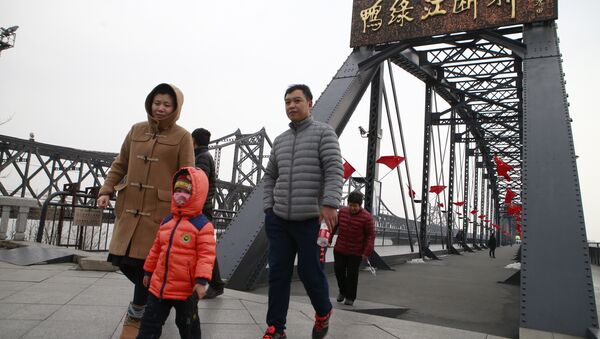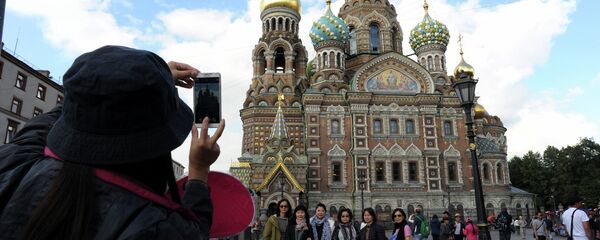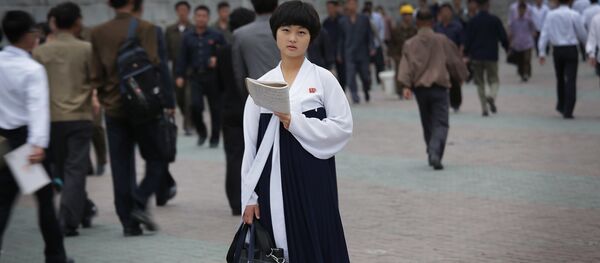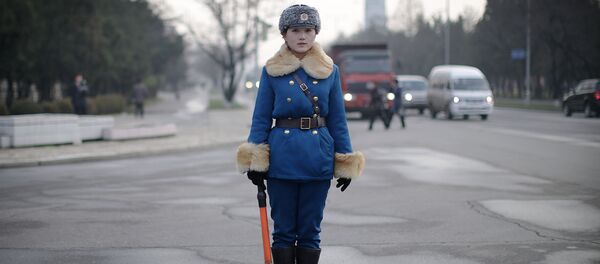Usually passengers will be able to see North Korean guards standing along the border, idle residents gathering along the bank or women washing clothing in the river. The guides on the boat always remind tourists to not take pictures of the soldiers whenever the boat comes near the shore.
"Having so many Chinese come watch them every day upsets them, so they throw stones at the boat as a warning," one of the boat's guides told the Global Times.
According to Liu, boats depart every 20 minutes, with each trip taking one hour and 40 minutes to two hours.
"Winter is our slow season. We're much busier when it's warmer," she noted.
Right across the river
Liu's travel agency is not the only choice for tourists who want to explore the neighboring country more deeply.
A natural boundary line between China and North Korea, the 790-kilometer long Yalu River runs through North China's Jilin and Liaoning provinces as well as the Ryanggang, Chagang and North Pyongan provinces in North Korea.
Many battles were fought along the river during the First Sino-Japanese War (1894-95) and the Korean War (1950-53). The Sino-Korean Friendship Bridge runs across the river linking Dandong and the North Korean city of Sinuiju.
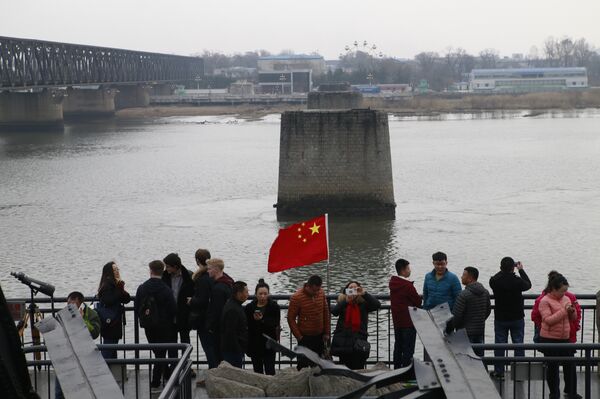
The Dandong-based Liaoning Yalu River International Travel Service offers two packages for North Korea — a four-day trip, covering scenic spots in Pyongyang and Kaesong, and a one-day trip to Sinuiju.
Kaesong was the location where cease-fire negotiations during the Korean War started, before they moved to Panmunjom, where they were signed.
"The fees for visas and local guides vary for different nationalities. All tourists need to send a copy of their passports three days in advance if they want to join the trip," an employee from the company, surnamed Huang, told the Global Times on Sunday.
Huang explained that the one-day trip costs 750 yuan for Chinese mainland tourists, 1,050 yuan for residents of Hong Kong and 1,780 yuan for tourists from the EU.
Huang assured that the trip was safe, but also reminded travelers to abide by "the notifications for tourists" before entering North Korea. These notifications include not bringing any USB flash drives, laptops, cameras or print publications from the US or South Korea.
Constructed by the Japanese in 1911, this bridge was the first built across the Yalu River. Originally 944 meters long, only four of the 12 stone pillars survived bombings by the US Air Force in 1950, leading to its current name.
The remains of the bridge have been turned into a tourist attraction that allows visitors to get close to the North Korean waterfront and get a good look at Sinuiju across the way.
Sticking to the Chinese side
Tourists who want to meet North Korea people while staying in China can try heading to the many traditional Korean restaurants that line the bank of the Yalu River in Dandong.
Some of these restaurants hire waitresses from North Korea. In addition to waiting on tables, these waitresses also perform regularly scheduled traditional Korean songs and dances.
"Tourism in Dandong is quite popular since a lot of people want to explore this reclusive nation. It is also a nostalgia trip for some seniors to see the statues of North Korea's top leaders standing in the streets in North Korea or banners featuring quotes from famous leaders hung everywhere," Lü Chao, a research fellow with the Liaoning Academy of Social Sciences, told the Global Times on Sunday.
While North Korea may remain mysterious to some, for local residents in Dandong, the neighboring country has long removed its mask.
For them, North Koreans are no longer people seen in some vague images presented by the media — they are distant relatives, the waitresses they meet in restaurants, passers-by they encounter in the streets, workers in clothing factories or their business partners.
Zhang Hua — an electric motor shop owner in Huamei, Dandong's wholesale electronics market — told the Global Times that many of her clients are North Koreans.
An employee from a travel agency surnamed Ma told the Global Times on Sunday that locals have mixed feelings toward their neighbors. These feelings are often interwoven with pity, sympathy, hatred and admiration.
"You have to be cautious when doing business with North Koreans since they may refuse to pay their debts… but I sometimes envy how patriotic and happy they are," Ma said.
This article originally appeared on the Global Times website
